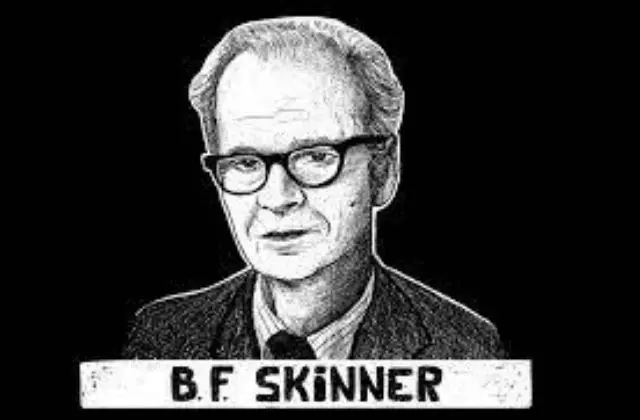Psychology’s fast development in the 20th century is due to many committed men and women, including B. F. Skinner. His huge impact on the theory of behaviorism helped him gain international recognition and the title of “one of the most illustrious American psychologists”. A 2002 study conducted by APA ranked him as the first most eminent psychologist of the 20th century based on journal citations, introduction in textbooks, and surveys.
To better understand how this happened, this article will provide you with 20 facts about B.F. Skinner’s life, education, theories, and influence.
1. Early life
B.F. Skinner (full name: Burrhus Frederic Skinner) was born on the 20th of March 1904 in Susquehanna, Pennsylvania. His father, William Skinner, was a lawyer, and his mother, Grace Skinner, was a homemaker. He also had a younger brother, Edward, who died at the age of 16. As a kid, Skinner loved the outdoors, building things, and enjoyed school. During his childhood, he had a close friend, Raphael Miller with whom he shared a passion for inventions.
2. Education
The influential psychologist initially wanted to become a writer and attended Hamilton College in order to receive a Bachelor of Arts in English literature. After graduation in 1926, he went to Harvard University. He kept on following his writing dreams, but without any success. Although Skinner was passionate about deduction and scientific reasoning, John Broadus Watson’s book, “Behaviorism”, was the main reason why he decided to change his career path and delve into psychology. In 1931, Skinner got a Ph.D. in Psychology from Harvard. (If you are looking for a high-quality custom essay on psychological theories, you can always rely upon paper writing services provided by experts from Custom Writings.)
3. Career life
After receiving his Ph.D., Skinner didn’t leave Harvard and decided to become a researcher there until 1936, when he became a teacher at the University of Minnesota. Nine years later, he started to work at Indiana University, where he was chair of the Psychology Department for some time (1946–1947). However, in 1948, he returned to Harvard, this time as a permanent teacher. Skinner retired in 1974.
4. Marriage and children
B. F. Skinner married Yvonne Eve Blue in 1936, with whom he lived until he died in 1990. They met in July 1936 when Skinner was working on some post-doctoral research, while Yvonne came to Massachusetts to visit some of her friends. The couple got married four months later, on the 1st of November. They had two daughters: Julie Vargas, who is today the President of the B. F. Skinner Foundation, and Deborah Buzan, an artist.
5. B.F. Skinner’s views on religion
B.F. Skinner grew up in a relatively religious community and became an atheist after a Christian teacher tried to ease his fear of the Hell that his grandmother described. She showed him the coal fire in the heating stove and told him that little children who tell lies were thrown in a place similar to that after they die. In college, he attended compulsory morning Chapel. When he was older, he led a life that he perceived as kind of religious and used to take communion daily with himself. Skinner declared that science, not religion, taught him the most useful values.
Learn more about Sigmund Freud’s Contribution to Psychology
6. B.F. Skinner – the Father of Operant Conditioning
Besides being known as one of America’s most influential psychologists, Skinner is also called ‘the Father of Operant Conditioning’, as he played a big role in its development. He created the ‘Skinner Box’ in which he ran experiments on animals. The psychologist concluded that if a behavior is followed by a reward, that behavior is more likely to be repeated. However, if it is followed by some sort of punishment, it is less likely to be repeated. In addition, Skinner stated that there can be three types of responses (or operants) that result from a behavior: neutral operants, reinforcers, and punishers.
7. Skinner was inspired by other psychologists in his work
Some of his biggest inspirations were psychology peers such as John B. Watson and Ivan Pavlov. The concept of Operant Conditioning was based on ideas from the Law of Effect, which was developed by Edward Thorndike, who studied learning in animals and noticed that behavior that is followed by pleasant consequences is likely to be repeated, while any behavior followed by unpleasant consequences is likely to be stopped.
8. Radical Behaviorism
B. F. Skinner was very fond of Radical Behaviorism, which was his own philosophy of behavioral science. In his vision, our behavior and the environmental factors that influence it have more importance to the fundamental understanding of our psychological state than anything else.
9. Superstitious behavior
In 1947, Skinner published a study based on superstition in animals’ lives after doing experiments on hungry pigeons. A device fed them on a daily basis and the observers stated that three-quarters of the birds had become superstitious, as they associated their behavior or actions with receiving food.
10. Scientific inventions
Besides being a theorist, Skinner was also an inventor. As mentioned before, during his Operant Conditioning research, he created the Skinner Box, alternatively known as “an operant conditioning chamber”. He invented it while he was attending Harvard University. Over the years, this apparatus has become a popular choice in many research disciplines. The Skinner Box was usually accompanied by a cumulative recorder – an instrument he created to conveniently get a report regarding an animal’s behavioral responses.
Learn more about Jean Piaget’s Contribution to Psychology
11. B. F. Skinner was born on the Pisces-Aries cusp
B. F. Skinner was born at both the end of the Pisces season and the beginning of the Aries season, meaning that there’s a possibility he had qualities of these two signs. Those born on the 20th of March have a different way of perceiving things and not everybody will agree with their interpretation. On top of that, the Pisces-Aries cusp gives them intuition and compassion. People born on this date try to align themselves with people who share the same interests.
12. Awards
For his contribution to the development of psychology, B. F. Skinner was granted plenty of awards, such as the National Medal of Science (1968), which is an honor given by the President of the United States to those who have made a huge impact to the advancement of knowledge in different fields, including the behavioral and social sciences.
13. Throughout his life, he published many books and articles
Although he traded his dream to become a writer for the one of becoming a psychologist, Skinner took advantage of his writing skills and published 21 books and 180 articles! He decided to use literature as a way to bring forward his concepts. One of his most popular books is “Walden Two,” a utopian novel published in 1948.
14. He created devices since he was a child
During his childhood, Skinner made use of his creativity by making a lot of ingenious gadgets. During this process, he was often accompanied by his friend, Raphael Miller, with whom he had set up a telegraph line to talk to each other.
Learn more about Albert Bandura’s Contribution to Psychology
15. Skinner ran an elderberry business
In his youth, besides being an inventor, B. F. Skinner was also a businessman. As usual, his partner was his friend, Raphael. The intelligence and imagination of these two young men didn’t fail them. They put together a device whose purpose was to separate ripe berries from unripe ones.
16. B.F. Skinner’s contribution to teaching
Skinner wasn’t only a great psychologist, but also an outstanding teacher. Moreover, As a professor, he had a lot of ideas regarding education, which can be discovered in his book “The Technology of Teaching”, where he talks about the main purposes of schooling.
17. Later life
In his final years of life, Skinner’s got a lot of public attention. His retirement in 1974 didn’t symbolize the end of his activity, as he kept on improving the field of behavioral psychology. Also, that’s when he started writing his autobiographical works: “Particulars of my life”, “The Shaping of a Behaviorist” and “A Matter of Consequences”. He died of leukaemia on the 18th of August 1990 in Cambridge, Massachusetts, USA, at the age of 86.
18. William James Fellow Award
B.F. Skinner was granted the William James Fellow Award by the American Psychological Association in honor of his contribution to psychology. Although he received it eight days before his death, Skinner did not hesitate to give a 15-minute award acceptance speech.
19. The first book he published
B.F. Skinner’s first book was “The Behavior of Organisms”. It was published in 1938 and it was supported by his research with rats and the feeding responses they exhibited.
READ MORE: 20 Interesting Facts About Leon Festinger’s Life and Psychological Theories
20. B. F. Skinner’s influence and legacy
Skinner’s influence on psychology, especially on behaviorism, is incontestable. His theories influenced many areas of life, even dog training. To this day, researchers use his inventions in experiments. Additionally, his books are a treasure throve for young psychologists who are entering the field.
References: VeryWell Mind, Wikipedia, SNAC, SimplyPsychology, Simply Psychology, Psychologist Anywhere Anytime, Regis College, Wikipedia, Scientific Mindfulness, Psychology Today, The Secret of The Tarot, Wikipedia, GoodTherapy, Psychologist World, Biography, Wikipedia





